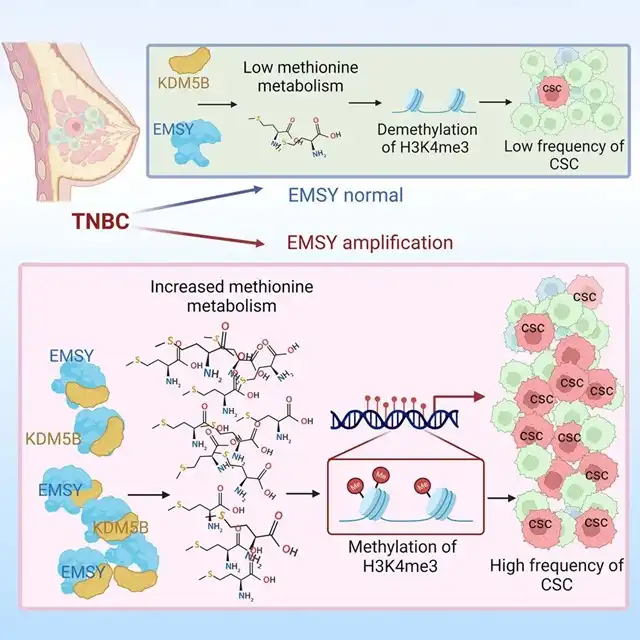Low Methionine Diet Shows Promise in Eliminating Triple-Negative Breast Cancer Stem Cells
- Normal Liver Cells Found to Promote Cancer Metastasis to the Liver
- Nearly 80% Complete Remission: Breakthrough in ADC Anti-Tumor Treatment
- Vaccination Against Common Diseases May Prevent Dementia!
- New Alzheimer’s Disease (AD) Diagnosis and Staging Criteria
- Breakthrough in Alzheimer’s Disease: New Nasal Spray Halts Cognitive Decline by Targeting Toxic Protein
- Can the Tap Water at the Paris Olympics be Drunk Directly?
Low Methionine Diet Shows Promise in Eliminating Triple-Negative Breast Cancer Stem Cells
- Should China be held legally responsible for the US’s $18 trillion COVID losses?
- CT Radiation Exposure Linked to Blood Cancer in Children and Adolescents
- FDA has mandated a top-level black box warning for all marketed CAR-T therapies
- Can people with high blood pressure eat peanuts?
- What is the difference between dopamine and dobutamine?
- How long can the patient live after heart stent surgery?
Low Methionine Diet Shows Promise in Eliminating Triple-Negative Breast Cancer Stem Cells
Triple-negative breast cancer (TNBC) is characterized by its high biological malignancy, strong invasiveness, and poor prognosis, posing a significant challenge in clinical diagnosis and treatment.
Tumor stem cells, a small group of tumor cells with the ability to form tumors, self-renew, and exhibit low differentiation, play a crucial role in TNBC, contributing to treatment resistance, recurrence, and metastasis.
Targeting these tumor stem cells has emerged as a key strategy in the therapeutic approach for TNBC.
On January 29, 2024, Fudan University’s affiliated Cancer Hospital published a research report in the online edition of “Cell Reports Medicine,” revealing the role of the BRCA2-interacting transcriptional repressor EMSY in reshaping the tumor metabolic microenvironment and enhancing methionine metabolism.
The study, led by Dr. Liu Cuicui and the team of Dr. Yu Keda, demonstrated that manipulating methionine levels through diet could specifically eliminate TNBC stem cells, ultimately inhibiting tumor progression.
The research, which integrated multi-omics data analysis, cellular functional experiments, mouse models, and clinical sample validation from Fudan University’s affiliated Cancer Hospital TNBC cohort, identified several critical molecules that amplify the expression in TNBC tumor stem cell subpopulations, significantly affecting the enrichment of aldehyde dehydrogenase (a classic marker of breast cancer stem cells). Of particular interest was EMSY, which induced a phenotype resembling BRCA mutations and was found to be highly expressed in the TNBC stem cell population. Elevated EMSY levels promoted the enrichment of aldehyde dehydrogenase-positive cells, enhancing the self-renewal and tumor-forming ability of tumor stem cells, showing a significant positive correlation with adverse outcomes in TNBC patients.
Mechanistically, the study revealed that EMSY competitively binds to lysine-specific demethylase 5B (KDM5B, also known as histone demethylase JARID1B) JmjC domain, a crucial domain for KDM5B enzyme activity. EMSY inhibition of KDM5B enzyme activity regulated methionine metabolism and the level of trimethylation on the fourth lysine residue of histone H3 (H3K4me3), promoting self-renewal and tumor formation in breast cancer stem cells. Additionally, in TNBC patient-derived tumor xenograft models with amplified EMSY, a combination therapy of poly ADP-ribose polymerase (PARP) inhibitor Olaparib (especially effective for non-tumor stem cells) and methionine-deprived diet showed better efficacy in killing tumor cells, reducing breast cancer stem cell proportion, and inhibiting tumor growth.
Therefore, the study elucidates a novel molecular mechanism of EMSY-mediated methionine metabolism in regulating tumor stem cells and the progression of TNBC. The proposed combination therapy involving PARP inhibitor and methionine-deprived diet represents a promising strategy for TNBC treatment. Understanding the unique amino acid metabolism characteristics of tumor stem cells and targeting their vulnerabilities will become a crucial clinical approach for eradicating tumor stem cells, offering a new strategy in cancer treatment.

Controlling methionine intake can disrupt the normal methylation of tumors. Achieving a low methionine diet is not difficult, as high methionine content is primarily found in meat, eggs, and dairy products. Some low methionine (<100mg/100g) foods include:
- Apple: 2mg
- Grapes (Grade 1): 19mg
- Broccoli: 34mg
- Cucumber: 3mg
- Sweet Potato: 42mg
- Lettuce: 3mg
- Almonds: 45mg
- Australian Walnuts: 10mg
- Soy Milk (1°C): 65mg
- Pear: 4mg
- Corn: 50mg
- Watermelon: 4mg
- Peas: 60mg
- Tomato: 5mg
- Potato: 60mg
- Banana: 9mg
- Mushroom: 17mg
- Peanut Butter (2 TB): 85mg
- Kale, Cooked: 11mg
- Walnuts: 70mg
- Green Peas: 15mg
- Lentils: 75mg
- Carrot: 13mg
Reference: Cell Rep Med. 2024 Jan 29:101396. IF: 14.3
Low Methionine Diet Shows Promise in Eliminating Triple-Negative Breast Cancer Stem Cells
(source:internet, reference only)
Disclaimer of medicaltrend.org
Important Note: The information provided is for informational purposes only and should not be considered as medical advice.



